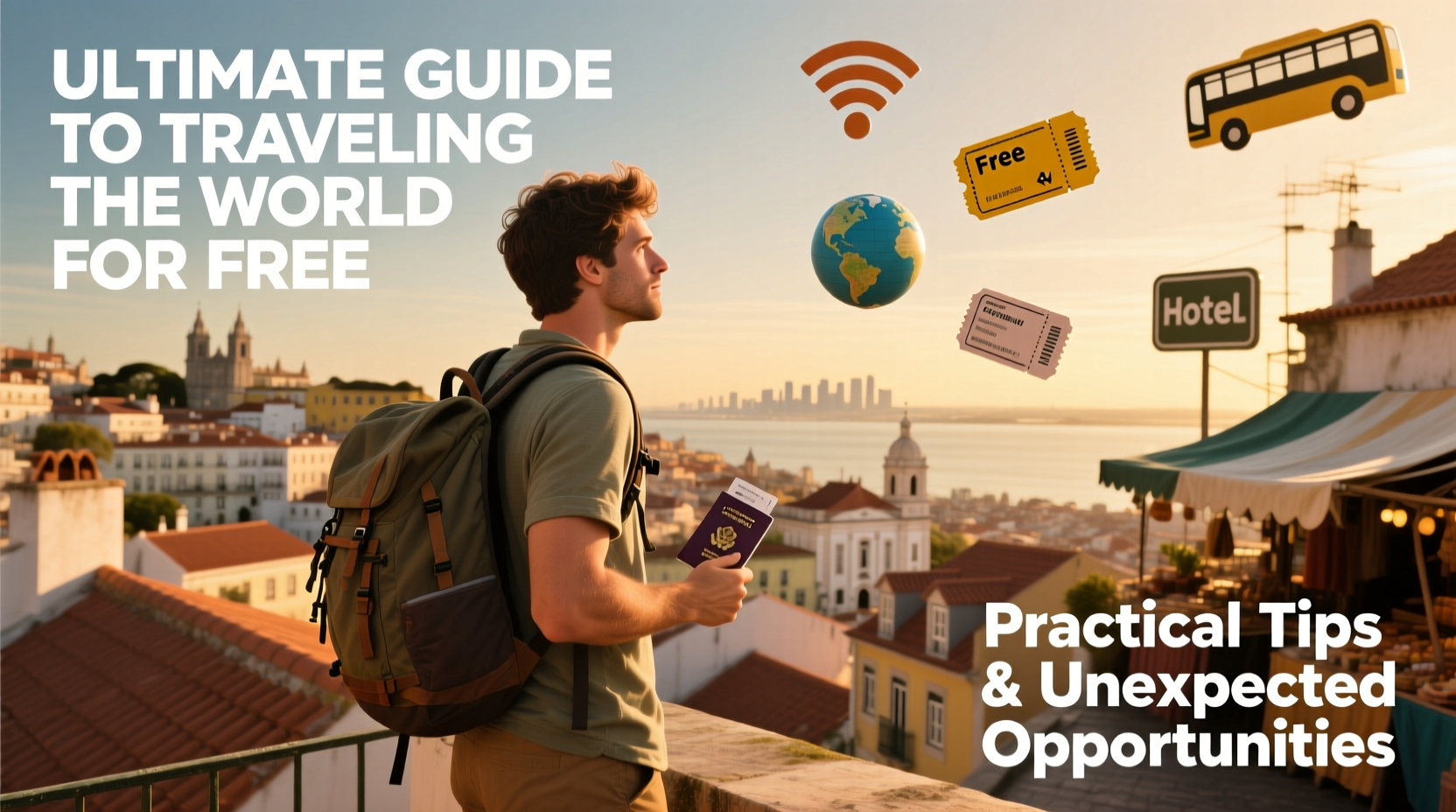Traveling the world without spending money on accommodation, food, or even transportation isn’t a fantasy—it’s a reality for thousands of people every year. While “free” travel still requires effort, planning, and flexibility, it’s entirely achievable through a mix of resourcefulness, skill exchange, and leveraging overlooked systems. This guide breaks down proven methods, lesser-known opportunities, and actionable steps to help you explore the globe with minimal financial cost.
How Free Travel Actually Works

Free travel doesn’t mean zero input—it means replacing cash with time, skills, or adaptability. Most successful free travelers use a combination of hospitality networks, work-for-stay arrangements, and alternative income sources. The key is shifting from a consumer mindset to a contributor mindset: instead of paying for services, you offer value in return.
For example, staying with a host in exchange for helping maintain their guesthouse, teaching English informally, or assisting with farming tasks can eliminate lodging and food costs. Airlines occasionally offer mistake fares or award tickets. Some countries even incentivize remote workers to live locally through digital nomad visas with low-cost living support.
Top 5 Proven Ways to Travel for Free
- Hospitality Exchange Networks: Platforms like Couchsurfing, Trustroots, and BeWelcome connect travelers with locals who offer free stays. Success depends on clear communication, mutual interests, and respectful behavior.
- Work Exchange Programs: Sites such as Workaway, WWOOF (World Wide Opportunities on Organic Farms), and HelpX allow travelers to trade 4–6 hours of daily work for room and board. Common roles include gardening, cooking, childcare, or social media help.
- Airline Mistake Fares & Award Travel: Monitor deal websites like Secret Flying, Scott’s Cheap Flights, or FlyerTalk. With airline miles or credit card points, many fly internationally for nearly nothing. Occasionally, pricing errors lead to ultra-cheap long-haul tickets.
- House & Pet Sitting: TrustedHousesitters and MindMyHouse connect travelers with homeowners who need care for their property and animals. In exchange, you get rent-free accommodation in desirable locations—often with full access to amenities.
- Skill Bartering Abroad: Offer services like web design, photography, yoga instruction, or language tutoring in exchange for lodging or meals. Many boutique hostels, retreat centers, and co-living spaces welcome skilled contributors.
Real Example: From Office Job to Global Travel
Lena, a graphic designer from Canada, left her job after saving $3,000 and began traveling across Southeast Asia using Workaway and house sitting. She spent two weeks on a permaculture farm in Thailand designing a logo in exchange for stay and food. Later, she pet-sat in Portugal for three months, gaining access to a seaside apartment while caring for two cats. By combining remote freelance work with no-cost accommodations, she extended her trip for over a year with minimal spending.
“Free travel isn’t about getting something for nothing—it’s about exchanging value in a way that benefits both sides.” — Mark Watson, Long-Term Traveler and Founder of Nomad Skill Share
Step-by-Step Guide to Launching Your Free Travel Journey
Transitioning into cost-free travel requires preparation. Follow this timeline to build momentum:
- Month 1: Research & Profile Setup
Create profiles on at least three platforms: Couchsurfing, Workaway, and TrustedHousesitters. Include clear photos, references if available, and a friendly bio highlighting your skills. - Month 2: Build Credibility
Get verified on platforms, request references from friends or past hosts, and complete any required training (e.g., WWOOF orientation). - Month 3: Secure First Opportunity
Apply to 5–10 listings with personalized messages. Prioritize short-term stays to build experience and reviews. - Month 4: Plan Initial Trip
Book a one-way ticket to a destination with high host availability (e.g., Spain, Mexico, Vietnam). Focus on regions known for strong work-exchange communities. - Ongoing: Rotate & Adapt
After each stay, ask hosts for recommendations or next opportunities. Many transitions happen organically through word-of-mouth.
Do’s and Don’ts of Free Travel
| Do | Don't |
|---|---|
| Communicate clearly and confirm expectations before arrival | Assume all work exchanges are the same—terms vary widely |
| Leave a thoughtful review for your host | Overstay without permission, even if the host seems flexible |
| Offer small gestures like cooking a meal or bringing local treats | Use free stays as a way to party or disrupt household routines |
| Carry a basic first-aid kit and personal supplies | Expect luxury amenities—many rural placements lack Wi-Fi or hot water |
Unexpected Opportunities You Might Overlook
- University Guest Stays: Some academic institutions allow visitors to stay in dorms during breaks at low or no cost, especially if attending lectures or events.
- Religious & Retreat Centers: Monasteries, ashrams, and meditation centers often host volunteers for free in exchange for simple duties like cleaning or gardening.
- Festival Crewing: Events like Burning Man, Glastonbury, or regional music festivals recruit staff who receive entry, food, and shelter.
- Yacht Crewing: Websites like CrewSeekers and FindACrew connect sailors with boat owners needing help on voyages. While not always “free,” many cover all expenses and provide adventure.
- Digital Nomad Grants: A growing number of cities and organizations offer stipends, free co-working, and housing to remote workers who contribute online content or community engagement.
Checklist: Before You Begin Free Travel
- ✅ Obtain travel insurance with coverage for volunteer work
- ✅ Pack light, versatile clothing and essential toiletries
- ✅ Carry copies of ID, visa documents, and emergency contacts
- ✅ Set up a reliable method for receiving money (Revolut, Wise, etc.)
- ✅ Install offline maps and translation apps
- ✅ Notify family or friends of your itinerary
- ✅ Learn basic phrases in the local language
FAQ
Is it safe to stay with strangers through hospitality networks?
Most platforms have verification systems, reviews, and reporting tools. Safety improves significantly when you read profiles carefully, communicate in advance, and share your location with someone trusted. Many users report overwhelmingly positive experiences when using common sense.
Can I travel for free with a partner or pet?
Yes, but options may be more limited. Some hosts explicitly welcome couples or pets, while others prefer solo travelers. Be transparent in your profile and applications. Pet-friendly stays are common on housesitting platforms.
Do I need special skills to qualify for work exchanges?
No formal qualifications are usually required. Enthusiasm, reliability, and willingness to learn matter more than expertise. However, having marketable skills (photography, construction, teaching) increases your appeal.
Conclusion
Traveling the world for free isn’t about luck—it’s about strategy, openness, and a willingness to engage meaningfully with new communities. Whether through farming in Italy, house sitting in New Zealand, or crewing a sailboat across the Caribbean, the opportunities exist for those ready to contribute value in non-monetary ways. The journey begins not with a full bank account, but with a prepared mindset and the courage to reach out.









 浙公网安备
33010002000092号
浙公网安备
33010002000092号 浙B2-20120091-4
浙B2-20120091-4
Comments
No comments yet. Why don't you start the discussion?